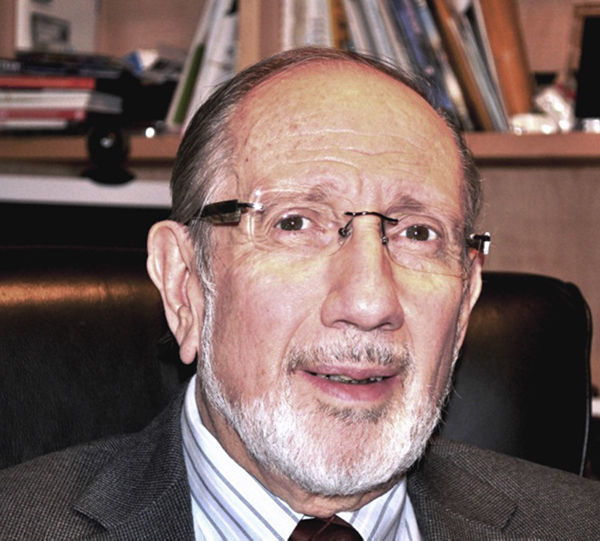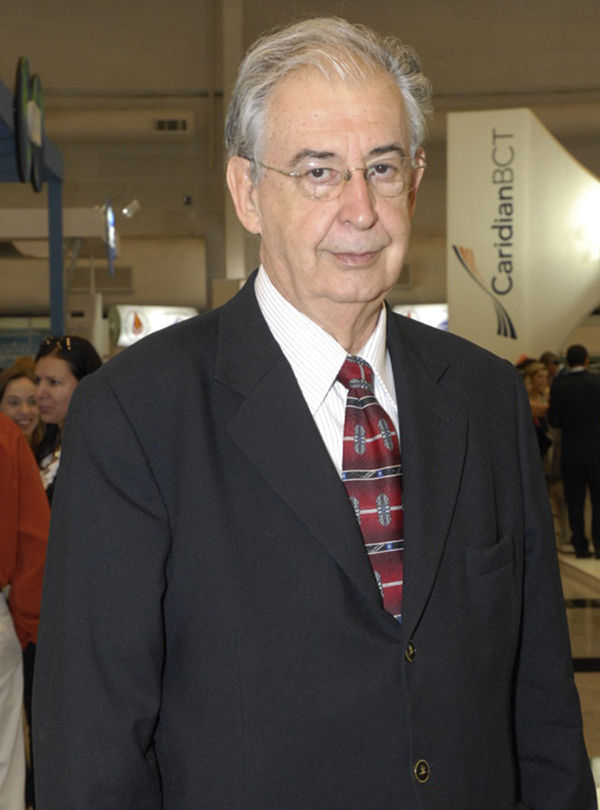During Hemo 2014, a tribute was paid to the dedication of three of our most experienced colleagues. In a special session of the congress, Professors Marcos Borato Viana, Celso Bianco, and Roberto Passetto Falcão were honored in recognition of their years of commitment to the fields of hematology and transfusion medicine, in particular to teaching and research.
Dr. Dimas Tadeu Covas, the President of the Associação Brasileira de Hematologia, Hemoterapia e Terapia Celular and Dr. Fernando Ferreira Costa, Editor in Chief of the Revista Brasileira de Hematologia e Hemoterapia would also like the readers of the journal to recognize the dedication of these professionals to Brazilian science and development in the area of hematology and transfusion medicine.Professor Marcos Borato Viana
Professor Emeritus at the Universidade Federal de Minas Gerais (UFMG), Professor Borato has taught medicine for 34 years (1976–2010). He is an important part in the history of the Pediatrics Department and of the UFMG itself as he was Director of the School of Medicine (1998–2002) and Vice-Chancellor of the university (2002–2006). He currently holds the position of special advisor to the Chancellor, Jaime Arturo Ramírez.He graduated in Medicine at the UFMG in 1971, when he was also awarded the Oswaldo Cruz prize for finishing first in his class. He completed his medical residency in pediatrics in the Hospital das Clínicas (1972 and 1973) and in Hematology at the Hospital Felicio Rocho in Belo Horizonte (1974–1975), under the supervision of Professor Dr. Romeu Ibrahim de Carvalho.
In 1977 he was admitted to the Children's Memorial Hospital, Northwestern University, Chicago (USA) as a fellow in pediatric hematology and oncology, under Professor George Honig. The first hematologist trained in pediatrics in Brazil, he established the Group of Pediatric Hematology at the UFMG in 1981, which became a referral center in Minas Gerais and in Brazil for the treatment of children and adolescents with oncohematological diseases. From the original Pediatric Center, he also gathered other clinical hematologists from the UFMG to create the Hematology Service in the Hospital das Clínicas of the UFMG, and acted as either coordinator or vice coordinator until 2009. He helped train dozens of healthcare professionals specifically in the area of pediatrics. He taught at one time or another in every one of the pediatrics undergraduate courses, from initial patient observation to internships, and supervised almost fifty undergraduate students of medicine, nursing, and biology.
In 1989, his master's dissertation, supervised by Professor Ennio Leão and entitled “Sea-blue histiocyte syndrome as a manifestation of a Niemann-Pick disease variant: A family study” was the first postgraduate degree in pediatrics to be approved in the UFMG. In 1993, he defended a doctoral thesis entitled “The nutritional state as a prognostic factor of acute lymphoblastic leukemia in children: A multivariate analysis”, at the then called Escola Paulista de Medicina, under Professor Wagner Silvestrini.
Professor Borato has already completed the supervision of 29 master's and eight doctoral students in the Postgraduate Program in Health Sciences – Child and Adolescent Health of the UFMG. An additional six doctoral students are expected to submit their theses in 2015. He has been a grantee of the Brazilian Research Council (Conselho Nacional de Desenvolvimento Científico e Tecnológico - CNPq) for 20 years and is the author, in addition to books and book chapters, of 106 scientific articles published in national and international journals. He is close to reaching a thousand citations in the Web of Science and Scopus databases, with an h-index of 16 for both.
For many years, he has been a pioneer in the study of childhood leukemia, focusing on less studied prognostic factors such as nutritional status, socioeconomic status, and adherence to treatment. His current main line of research is devoted to the study of sickle cell disease and other hemoglobinopathies.
As a citizen he has always been concerned with bringing about a more equitable society, and has acted politically in medical organizations and the society as a whole. At the Associacão Brasileira de Hematologia, hemoterapia e Terapia Celular, ever since the days of the Colégio Brasileiro de Hematologia, he has participated greatly in committees, events, and more recently, in the editorial board of the Revista Brasileira de Hematologia e Hemoterapia.
[CV extracted from the speech given by Professor Benigna Maria de Oliveira, during Hemo 2014 in Florianópolis]Professor Celso Bianco
Celso Bianco was born in São Paulo, Brazil. He received his medical degree in 1966 from the Escola Paulista de Medicina, UNIFESP, and did his residency at Hospital São Paulo. In 1969, he became a post-doctoral fellow in the laboratory of Dr. Victor Nussenzweig of the New York University School of Medicine in New York City, USA where he participated in the discovery of membrane receptors of lymphocytes that distinguish B and T lymphocytes and allow their physical separation. After five years, he joined the laboratory of Dr. Zanvil Cohn at the Rockefeller University in New York, where he studied monocyte and macrophage membrane receptors and their role in phagocytosis and inflammation. In 1978, he moved to the State University of New York, where he became a professor of pathology. There he described a receptor for fibronectin on the membrane of monocytes and macrophages that promoted their binding to sites of injuries. In 1982, he joined the New York Blood Center as Director of Science and Technology. This was the period when the true impact of blood-borne infections transmitted by transfusion, in particular hepatitis, HTLV-I/II and the virus of AIDS later identified as HIV, started to be recognized. Dr. Bianco worked on donor screening methodology, donor notification and counseling and the follow up of infected blood donors. He also studied other transfusion-transmitted infections such as babesiosis and Chagas. He took on the position of Vice President of Medical Affairs of the New York Blood Center in 1992, and continued to work on transfusion-transmitted diseases.He moved to America's Blood Centers (ABC) located in Washington, D.C. in October 2000 where he worked until his retirement in September 2012. ABC is an association of independent, not-for-profit community-based blood centers that provides half of the United States and a quarter of the Canadian volunteer blood supply.
Dr. Bianco is a member of several professional and scientific societies including the Associacão Brasileira de Hematologia, hemoterapia e Terapia Celular (ABHH), the American Association of Blood Banks (AABB) and the American Society of Hematology (ASH). He is currently the president of the International Society of Blood Transfusion (ISBT). He was also the chairperson of the Scientific Research Advisory Committee of Canadian Blood Systems. He was a member of U.S. advisory boards in transfusion medicine such as the Advisory Committee on Blood Safety and Availability and the New York State Council on Blood and Transfusion Services. He was the Industry Representative in the Food and Drug Administration (FDA) Blood Products Advisory Committee.
Dr. Bianco became the president of the ISBT in July 2014. He is also a member of the board of the International Council for Commonality in Blood Banking Automation (ICCBBA), the organization that manages the ISBT 128 International Information Standard for Transfusion and Transplantation. He has published over 100 papers and has been an invited speaker at many national and international workshops and congresses. Throughout his professional life, he has dedicated a substantial amount of effort to the training of students and fellows, and has participated of innumerous training courses and meetings in Brazil, Argentina, Uruguay, Colombia, Venezuela, and Mexico, in Europe and in Asia.Professor Roberto Passetto Falcão
Graduated in Ribeirão Preto, University of Sao Paulo, where he teaches clinical medicine and hematology, Roberto Passetto Falcão was president of the Colégio Brasileiro de Hematologia (CBH) between 1997 and 2005 until its merger with the Sociedade Brasileira de Hematologia e Hemoterapia (SBHH), which resulted in the founding of the Associação Brasileira de Hematologia e Hemoterapia (ABHH) where he is currently scientific director. He became head of the hematology laboratory in the Medicine School in Ribeirão Preto because diagnosis is one of his favorite areas in particular hematology and immunology, including aplastic anemia, lymphocytes and myeloproliferative and lymphoproliferative diseases, especially chronic lymphocytic leukemia. He was a postdoctoral fellow at the University of Oxford in the United Kingdom.Born in Araraquara, Dr. Passetto initially had a dream of being a journalist. In his city, he even wrote for the sports section of a local newspaper, but decided to move to another area because then only law, engineering, medicine, dentistry and pharmacy offered space to specialize.
Even as a child Passetto began to admire physicians; when he was seven years old, his mother had breast cancer. It was at that time that he met Dr. Antonio Prudente, one of the founders of the Hospital do Câncer, for whom he has great esteem. As an adult, another point of reference was his professor of internal medicine and hematology, the internationally recognized hematologist Dr. Cassio Bottura.
During his academic life in order to support himself at university, he began teaching biology and genetics in a pre-college cram course. That is where he had the idea of creating his own university preparatory course; he founded the Oswaldo Cruz Course (COC), now found throughout Brazil. Father of four and grandfather of four grandchildren, Passetto has 130 published studies (PubMed), 1335 official citations of scientific papers (ISI) and has tutored 23 post graduate students.












